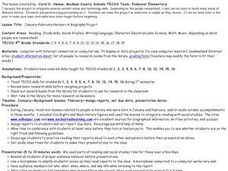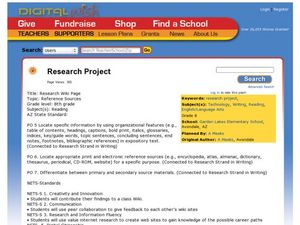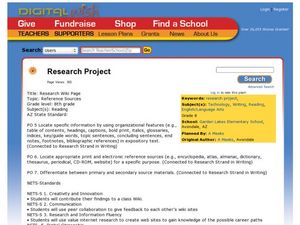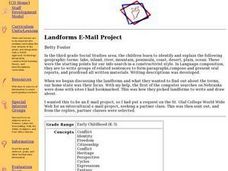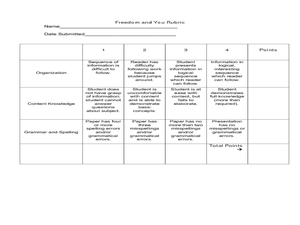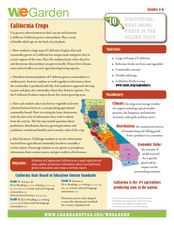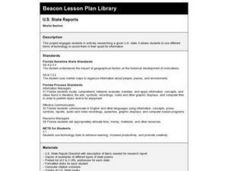Curated OER
Once Upon a Pop-Up Book
Third graders compile their writings into pop-up books after reading "The Jolly Postman: Or Other People's Letters." The book contains letters, invitations, essays, and narratives they have written previously. The project also includes...
Curated OER
Inventor's Project
Pupils conduct research about different inventors and their inventions. They use various types of resources to obtain information. Students use the information to create a class museum that contains artifacts, written reports, or models.
Conneticut Department of Education
Personal Finance Project Resource Book
Balancing a budget, paying taxes, and buying a home may feel out of reach for your high schoolers, but in their adult years they will thank you for the early tips. A set of five lessons integrates applicable money math activities with...
Penguin Books
A Teacher's Guide to The Omnivore’s Dilemma: A Natural History of Four Meals by Michael Pollan
"What should we have for dinner?" "What am I eating?" "Where did it come from?" These three questions are at the heart of Michael Pollan's The Omnivore's Dilemma: A Natural History of Four Meals. Pollan's book provides some very...
Curated OER
Respiratory and Circulatory Research Project
Students use the Internet and books to research the respiratory and circulatory systems. They also write a report on different diseases and present to the class.
Curated OER
A Hero Biography Project
Fourth graders study historical significant people born in January and February and note their accomplishments. Using given websites, 4th graders collect biographical information and participate in activities about a specified hero. ...
Curated OER
Research Project
After reading books about Black history, complete an outline and research important African Americans in history. Use the included outline to write a report.
Curated OER
RESEARCH PROJECT
Young scholars develop a list of famous people and choose an individual from the list. They create a web design for notes. They research their individual and add information to their bibliography. They finish by writing a report on the...
Curated OER
Polar Animal Research Reports
Third graders research and write a report on a polar animal. Each student be given a graphic organizer to complete on a particular animal. They are encouraged to use technology for the research and presentation portions of the project.
Curated OER
Landforms E-mail Project
Learners identify and explain geographic terms. They write descriptions of the terms. Students discuss landforms and draw pictures to illustrate them. Learners compose and present oral reports about landforms.
Curated OER
Balanced Literacy Project
Fourth graders review all the materials they've studied about the rain forest and begin to organize their research paper by choosing a topic. They begin by rereading the introductory book, "The Great Kapok Tree," by Lynne Cherry as well...
Curated OER
Australia Shape Book
For this Australia shape book worksheet, students use a map shape of Australia to make a shape book after printing as many pages they will need for their projects. They fasten the pages together for use in reports, vocabulary words or...
Curated OER
Unknown Element Project
Students work with a partner to determine the identity of an unknown element based on given descriptions. Groups use classroom textbooks, encyclopedias, and science internet sites to identify their unknown element then write a report as...
Curated OER
Element Project
Ninth graders review and discuss the Periodic table and its 53 elements. They choose one element to become an expert on and then create a written Report in the form of a poster about their choosen element to be presented to the class.
Curated OER
Projects
Pupils write a typed report. In this writing lesson students type a 3 to 5 page report and present it to the class.
Curated OER
Search Report of Information
Learners research and develop a Report of Information for a research paper. They select a topic, write 5-10 interesting questions, research and take notes, create an outline, and write paragraphs.
Curated OER
Comparing Time Periods in U.S. History: The Ashford Project
Fifth graders use a "fact book" comparing periods in American history then students create a picture to illustrate their assigned periods. # # students use their pictures and concept maps to write expository paragraphs about their...
Curated OER
Freedom and You
Students research the American Revolution. For this Revolutionary War lesson, students research facts about the American Revolution, write an expository essay, and peer edit for good content. The paper is suggested to be written after...
Curated OER
California Crops
Students explore agriculture by researching the native food crops of California. Students define a list of agriculture vocabulary terms and analyze maps of California which explain which foods come from which area. Students write a...
Curated OER
Honing in on Hummingbirds
Students explore ruby-throated hummingbirds. In this cross-curricular hummingbirds lesson, students listen to the book The Mystery of the Missing Hummingbirds and choose related topics to research with a partner. Students draw or write...
Curated OER
U.S. State Reports
Students conduct Internet research on a chosen U.S. state. They include information about the history, climate, geography, symbols, and tourist attractions of their state, and write an original poem.
Curated OER
The Legendary Raptors
How are raptors and airplanes alike? Combine science and language arts in this fun and interactive project. Young scientists research the animal in order to design their own aircraft, and compete in a contest for farthest, fastest, and...
Odyssey of the Mind
Odyssey of the Mind Curriculum Activity: Mathematicus Dramaticus
The best part about this resource is that you've got four wonderful activities to choose from. Each of the projects can work together or on its own to help learners understand the history of math and how it can be seen every day. In...
K12 Reader
Narrator’s Point of View Flow Chart
How can you tell what point of view a narrator is using, and why does it matter when reading or writing? Use a handy flow chart to determine whether or not your narrator is telling the story from a first or third person point of view.







